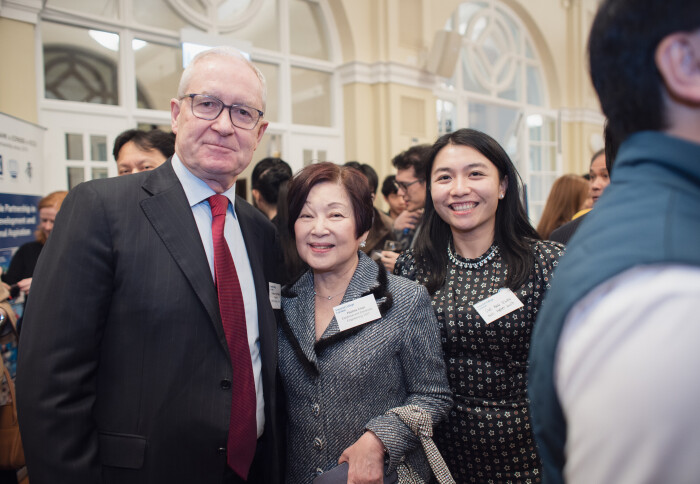Imperial’s Hong Kong connections celebrated

Credit: Ricky Ngan
A delegation from Imperial College London, including President Professor Hugh Brady, travelled to Hong Kong to celebrate Imperial’s flourishing ties.
Over 500 students from Hong Kong study at Imperial, with Hong Kong’s Department of Education annually supporting five to ten Hong Kong students through the Hong Kong Scholarship for Excellence scheme. Every year, over 100 papers are published with academics in Hong Kong, and more than 4,000 alumni live in Hong Kong.
The President attended an Alumni reception in Hong Kong, and was joined by nearly 100 academics, government partners, alumni and students. Both President Brady and Dean of the Faculty of Medicine Professor Deborah Ashby addressed attendees, reflecting on the exciting steps forward in renewable energy, brain imaging, drug discovery and medical robotics which collaborations between Imperial and Hong Kong researchers have produced.
Drug discovery
A major international effort to combat metastatic cancers is underway at the Laboratory for Synthetic Chemistry and Chemical Biology in Hong Kong – a collaboration between The University of Hong Kong, Imperial and Peking University. The project, part of the Health@InnoHK lab, and led by Professor Nick Long, aims to produce innovative, high-impact and leading-edge interdisciplinary research in drug discovery and development.
Medical robotics
“International collaboration is crucial for realising Imperial’s aim of developing world-changing research and innovation. By working together, the UK and Hong Kong can help to accelerate the technologies needed to tackle global challenges.” Professor Hugh Brady Imperial's President
Imperial’s Hamlyn Centre is working closely with the Multi-Scale Medical Robotics Centre in Hong Kong - part of AIR@InnoHK laboratory – to pioneer the next generation of robotic surgery.
The Centre is developing safe, effective and accessible technologies that can reshape the future of healthcare worldwide, focusing on technological innovation with a strong emphasis on clinical translation. It is at the forefront of research in imaging, sensing and robotics for addressing global health challenges associated with demographic, environmental, social and economic changes, including nanorobotics and wearable medical technology.
Renewable energy technology
Researchers from Imperial’s Department of Chemistry are working with City University of Hong Kong (CityU) on innovative technologies to expand the use of renewable energy. A new catalyst which could improve the process of storing renewable energy as hydrogen was designed by researchers at CityU, and tested by colleagues at Imperial in 2023. Although renewable energy generation, from sources like wind and solar, is rapidly growing, some of the energy generated needs to be stored for when weather conditions are unfavourable. It is hoped that the catalyst technology could play a key role in accelerating the production of cheap, easy-to-produce and efficient hydrogen storage and improve the take-up of renewable energy sources.

Professor Hugh Brady, President of Imperial College London, said: “International collaboration is crucial for realising Imperial’s aim of developing world-changing research and innovation. By working together, the UK and Hong Kong can help to accelerate the technologies needed to tackle global challenges.”
Article text (excluding photos or graphics) © Imperial College London.
Photos and graphics subject to third party copyright used with permission or © Imperial College London.
Reporter
Eleanor Green
Communications Division


